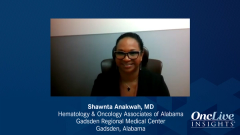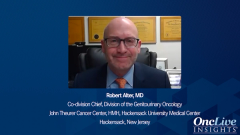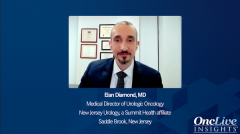
Toxicities and Quality of Life with IO-IO Therapies in Patients with Advanced RCC
Two oncologists describe common adverse events seen with IO-IO combination treatment regimens for advanced renal cell carcinoma, and how they interpret quality of life data from the CheckMate 214 trial.
Episodes in this series

Sumeet Bhatia, MD: In terms of quality of life, as you’ve been at both ends of the spectrum with patients who’ve been on nivo [nivolumab]-ipilimumab and have seen IO [immuno-oncology] with a TKI [tyrosine kinase inhibitor], how do you compare their relative toxicities as well as long-term sequelae of any of these therapies?
Eric Jonasch, MD: That’s a really good question. Some data were presented and have been published looking at the quality of life with [ipilimumab-nivolumab] demonstrating that if you compare to sunitinib, the average using things like the FKSI [functional assessment of cancer therapy-kidney symptom index] scores, you do see that there is a numeric improvement in the overall quality of life in individuals who are on ipilimumab-nivolumab compared to sunitinib. For the individuals who do get through ipilimumab-nivolumab, the first 4 doses of ipilimumab, who don’t develop substantial toxicities from IO and then are on maintenance, nivolumab, they have a pretty good life. It’s a great quality of life to be on single-agent nivolumab. And so from that standpoint, you don’t have to deal with the hand-foot syndrome, diarrhea, or hypertension. Of course, this is looking at the medians of these patients. The subset of individuals who do develop the many itises that you can develop obviously would have a different perspective on things. But it ends up becoming what I’d say with ipilimumab-nivolumab, this dichotomization. You have some people who have very substantial issues, and then you have some who have none. Whereas, with IO/TKIs or TKIs alone, there’s a higher probability of having some degree of toxicity, so I think it ends up being again not exactly the same between the 2 groups. But definitely, there can be good quality of life on ipilimumab-nivolumab.
Sumeet Bhatia, MD: In my practice, I’ve actually dreaded endocrinological adverse effects. There have been patients who have developed sudden diabetic ketoacidosis. I remember seeing this patient in my clinic, and my nurse came in and said, “Last week the laboratory results were fine, her blood sugar today is 900 [mg/dL].” My answer was, “Oh, you must be wrong.” Sure enough, the patient was in diabetic ketoacidosis. This can happen so suddenly. I’ve seen it 2 to 3 times, and as I’ve reviewed the literature, it almost seems that the long-term adverse effect of IOs appears to be diabetes. When these people become long-term survivors, 11% become diabetics later, which is particularly interesting. Now that is not just in kidney cancer, but also in various malignancies. I have started worrying about what it means for these patients years down the road. What has your experience been in this situation?
Eric Jonasch, MD: Paradoxically, I would say of the endocrinopathies, type 1 diabetes, which a number of my patients have unfortunately also developed, can really be life-altering and can be very problematic. The thyroiditis and even hypophysitis, as terrible as it may seem, is quite easily managed because there is basically hormone replacement therapy. But absolutely, the first case that I presented, although this was an IO/TKI patient, we’ve had a number of patients who’ve been on ipilimumab-nivolumab; they basically have developed irreversible posterior hypophysitis. It’s very manageable if that happens, but it is a scary sort of thing. But the diabetes, yes, I agree. It’s there and it’s real. It’s definitely more common with people who receive ipilimumab-nivolumab compared to an IO/TKI and is life-altering.
Transcript edited for clarity.








































